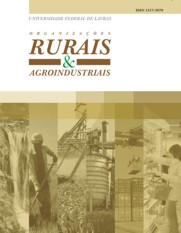FOOD CONTAMINATED BY PESTICIDES: A BRAZILIAN SITUATION OVERVIEW
Resumo
Consumidores estão ficando cada vez mais exigentes quanto a qualidade dos produtos, incluindo novas variáveis de decisão no
momento de sua compras. Informações a respeito de aspectos nutricionais e a utilização de pesticidas têm alterado a preferências dos
consumidores. As novas estratégias de informação emergiram em resposta às novas características comportamentais do consumidor
e às novas características de competição do mercado de alimentos. Essas estratégias privilegiam o uso de sinais de qualidade, como
rotulagem, rastreabilidade, certificação, nomes de marcas e adoção de padrões mínimos de qualidade. A principal característica do
mercado brasileiro é a falta de padrões mínimos e as assimetrias de informação fortes. O mercado de alimentos frescos é afetado
pelo uso indiscriminado de pesticidas. A análise das informações obtidas pelo Programa de Análise de Resíduos de Pesticidas em
Alimentos (PARA) encontrou uma situação muito preocupante no Brasil. O objetivo deste trabalho é trazer mais informações sobre
a contaminação de pesticidas nos mercados de alimentos frescos no Brasil. A Economia de Custos de Transação é adotada como
um marco teórico para examinar a coordenação entre os agentes na cadeia e buscar alternativas sustentáveis para reduzir o uso
excessivo de pesticidas na produção de alimentos.
Palavras-chave: Agricultura, Alimento, Saúde, Agrotóxico e meio Ambiente.


